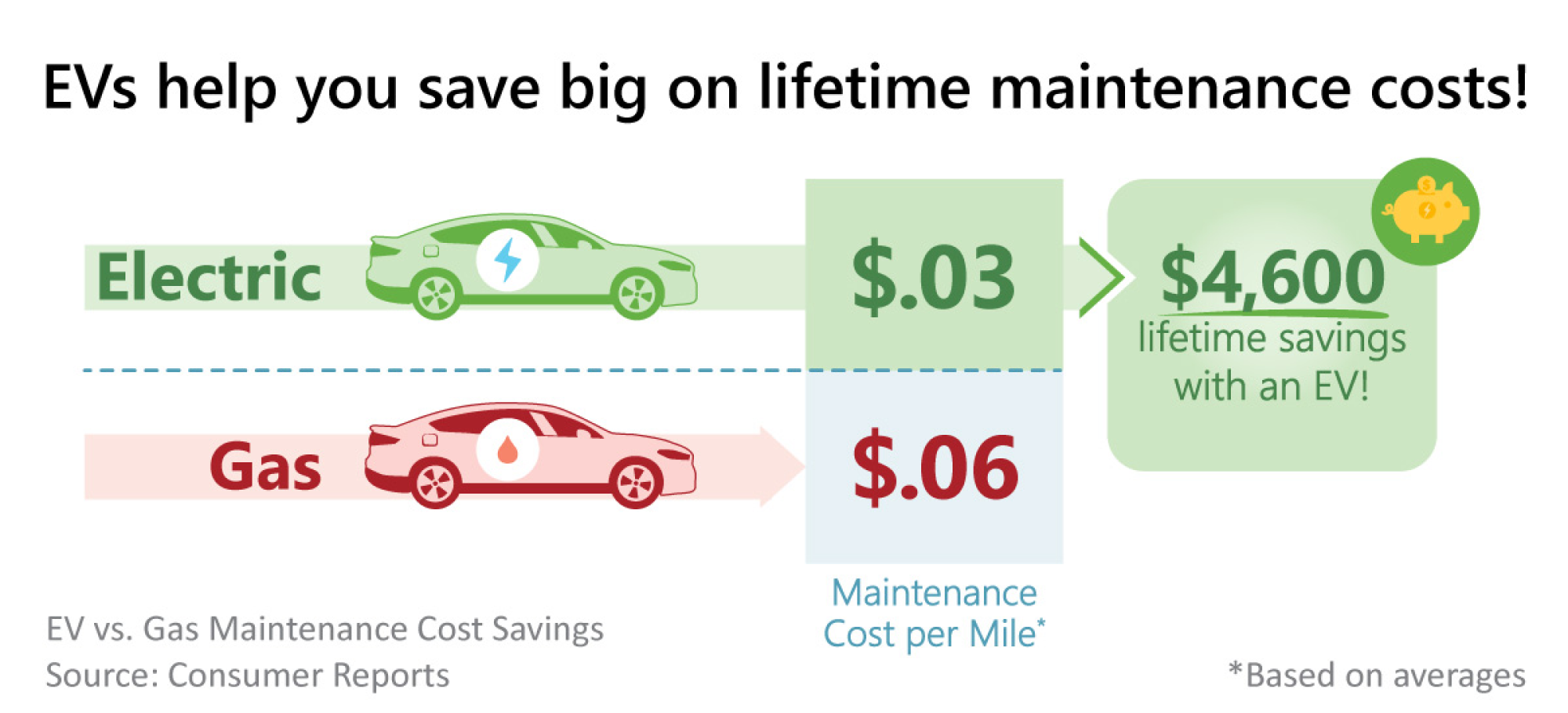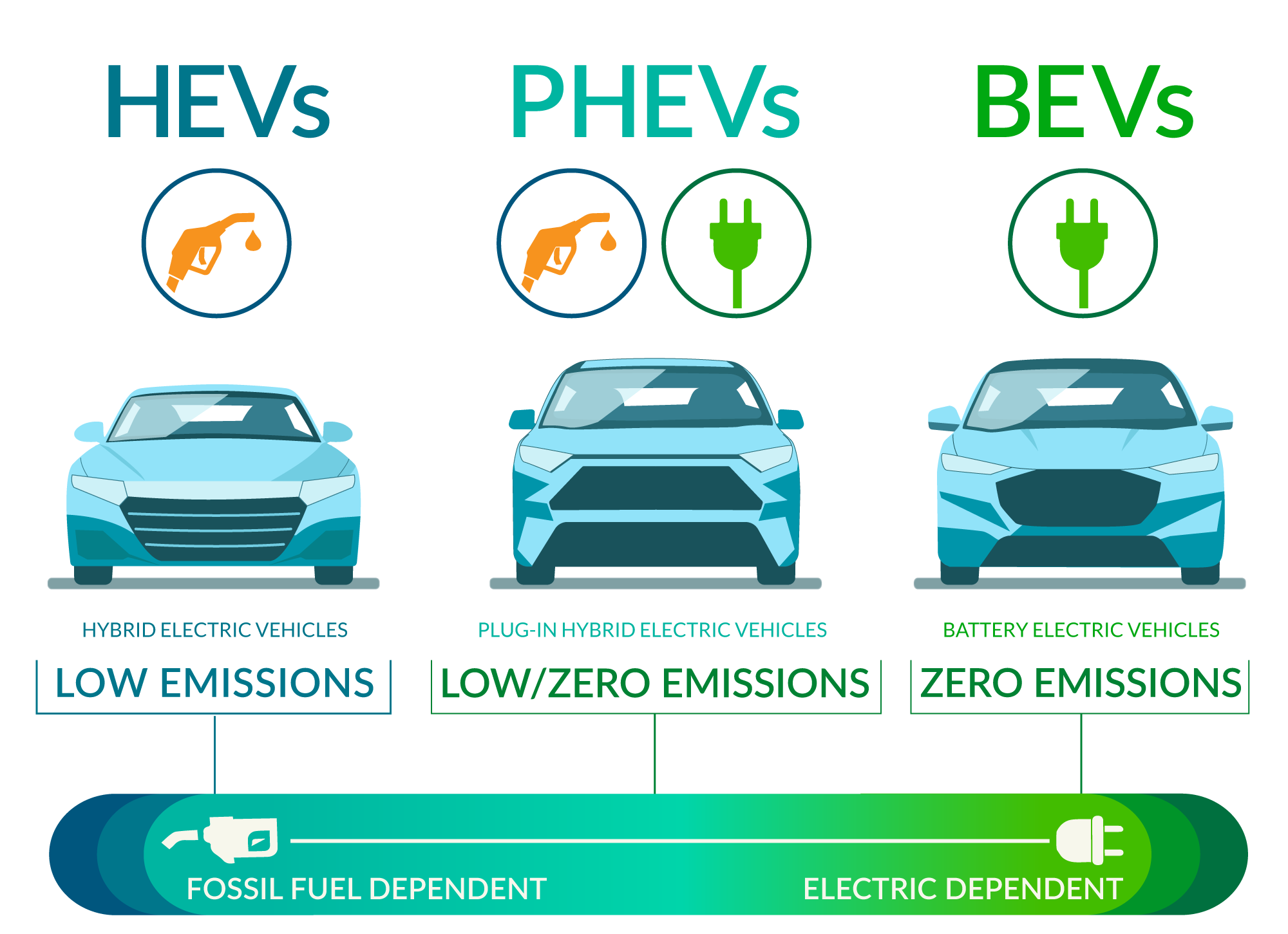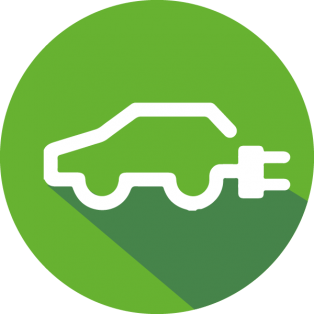Whether you’re considering switching to an electric vehicle (EV) or just curious about your options, we’re here to help.
Let’s start with the basics. EVs are powered by electric motors that use energy stored in batteries. Some run completely on electricity and some use a combination of electricity and a gasoline-powered internal combustion engine. Some you need to plug in to recharge. Others you don’t. All EV’s produce fewer emissions than conventional vehicles.
Why consider going electric?
There are many reasons to consider owning an electric vehicle, including lower fuel costs, tax incentives, reduced maintenance and environmental benefits.
Savings

Fuel Costs and Efficiency
When you drive an EV, you save on fuel costs because electricity is much cheaper than gas! U.S. electricity costs have been consistently lower than gasoline fuel for more than a decade.
Compare for yourself with research data provided by the U.S. Department of Energy, and their Vehicle Cost Calculator.

*Based on Maryland Averages 2/2023 and Level 2 Charging.
Average Maryland gas and electricity price sources:
AAA and US EIA website data
A great resource for EV drivers, the U.S. Department of Energy’s Alternative Fuels Data Center (AFDC) has created helpful tools that calculate the savings for you, including the Vehicle Cost Calculator.
Not only is the cost of fueling EVs less expensive, they are more fuel efficient than conventional vehicles. Many models of EVs can achieve the equivalent of over 100 miles per gallon.

Maintenance
As with any new car purchase, you may be concerned with the money—and time—required to keep it running in top shape. The great news is that EVs typically require less maintenance than conventional vehicles because:
- The battery, motor and associated electronics require little to no regular maintenance!
- There are fewer fluids to change – no more oil changes!
- Brake wear is significantly reduced and lasts longer
- There are far fewer moving parts, relative to a conventional gasoline engine
For more details visit AFDC’s Maintenance and Safety of Hybrid and Plug-In Electric Vehicles)
Incentives
When purchasing a new or used EV, there are many state and federal tax incentives that essentially reduce the price tag. In addition, the state of Maryland offers vehicle vouchers, equipment rebates, and free travel on HOV lanes.
Charging
EV Charging Types and Locations
There are more and more charging options available in the consumer market including Level 1 and Level 2 home and business chargers and DC Fast Charge stations. The time to fully charge an EV battery depends on the type of charger used.
Purchase your own charger and fuel your car at your convenience—even overnight! You can also take advantage of free or lower-cost electricity when you visit charging stations.
With more than 1,700 public stations in Maryland, you can easily incorporate charging your car into your daily routines.
Check out the AFDC Station Locator to find Maryland charging stations near you.
Environment
Reduced Environmental Impact
If you’re curious about driving an electric vehicle, you probably already know they are overall more environmentally friendly than traditional vehicles. That’s because when you drive an EV, you reduce the amount of emissions—and noise pollution—you add to the environment.
Emissions
EVs that run entirely on electricity produce no tailpipe emissions. Plug-in hybrid EVs that use a combination of electricity and a traditional internal combustion engine produce fewer emissions than non-electric vehicles. Maryland’s greenhouse gas (GHG) emissions reductions goals outlined in the Climate Solutions Now Act (CSNA) aim to achieve 60% GHG emissions reductions by 2031 and net-zero by 2045. Because transportation is the single largest GHG emissions generator in Maryland, representing over one-third of total GHG emissions, EVs play an integral role in helping Maryland meet the CSNA emissions reduction goal. Even though some of that electricity comes from fuel burning power plants, emissions are still reduced, since the production of electricity is more efficient than gasoline engines. As Maryland progresses with implementation of renewable energy, the electricity produced in the state will produce fewer emissions.
Use the AFDC’s interactive tool below to compare electricity sources and annual vehicle emissions by state.
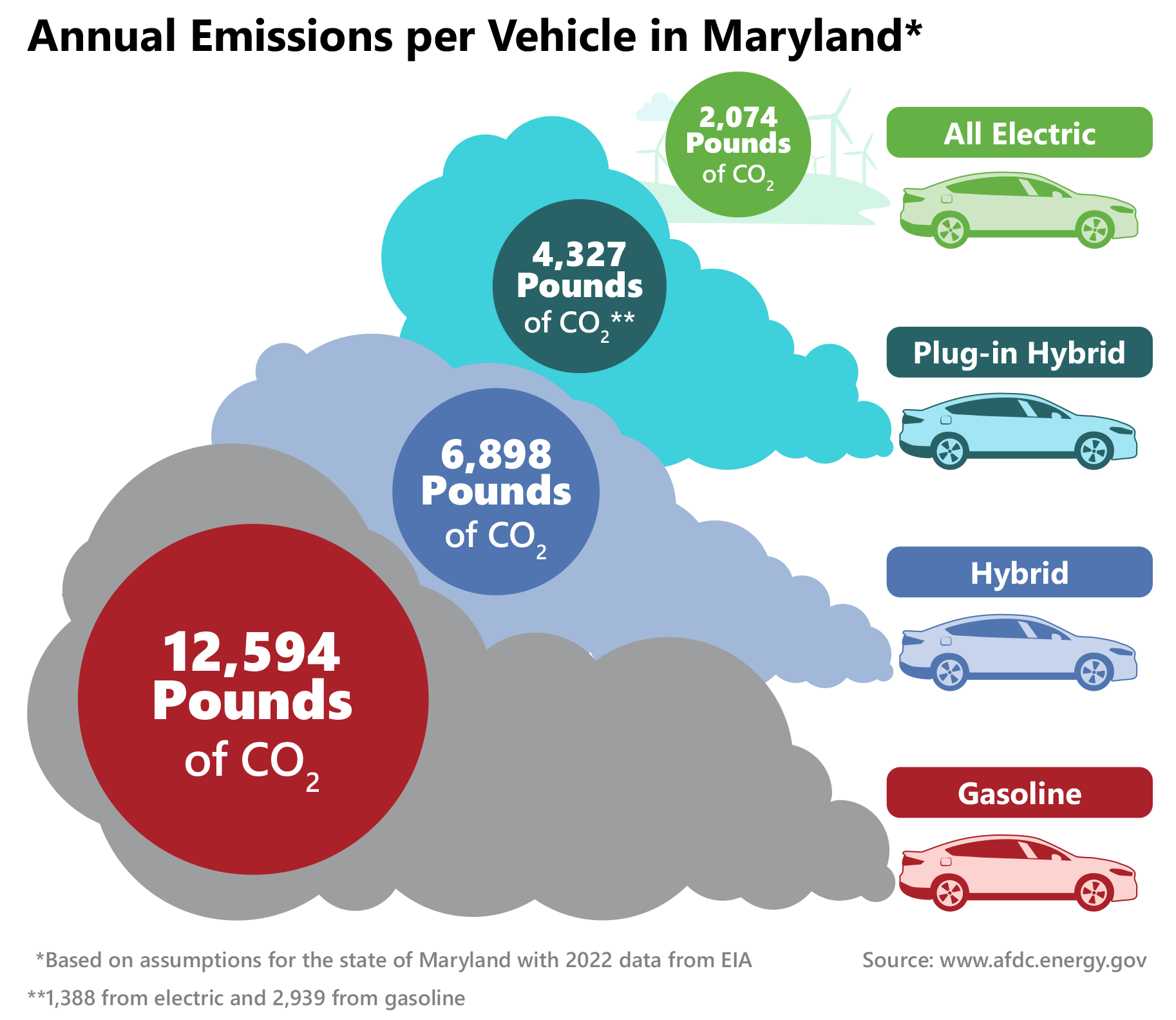

A Quiet Ride
Many people are pleasantly surprised to discover that EVs produce little to no noise. This reduces noise pollution and makes for a more enjoyable ride for drivers and passengers.
Types of EVs
There are three main types of electric vehicles:
Battery-Electric Vehicles (BEV):
use only a battery to power the motor and the batteries are charged by plug-in charging stations.
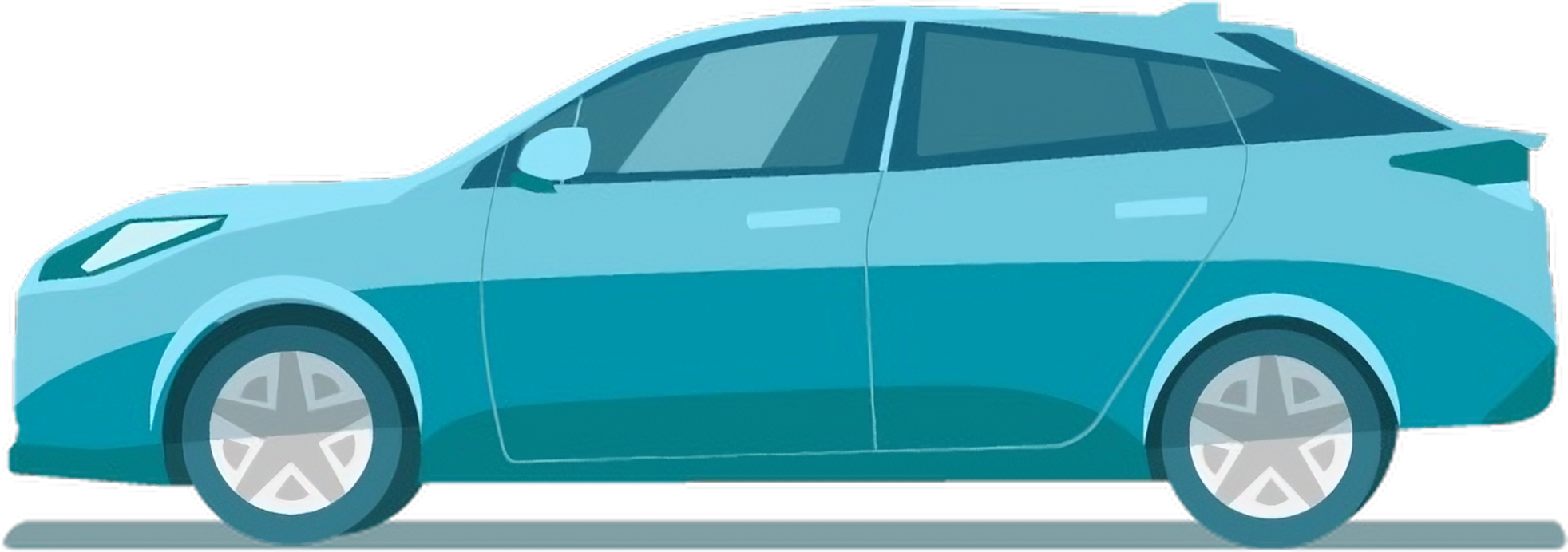
Ford Mustang Mach E
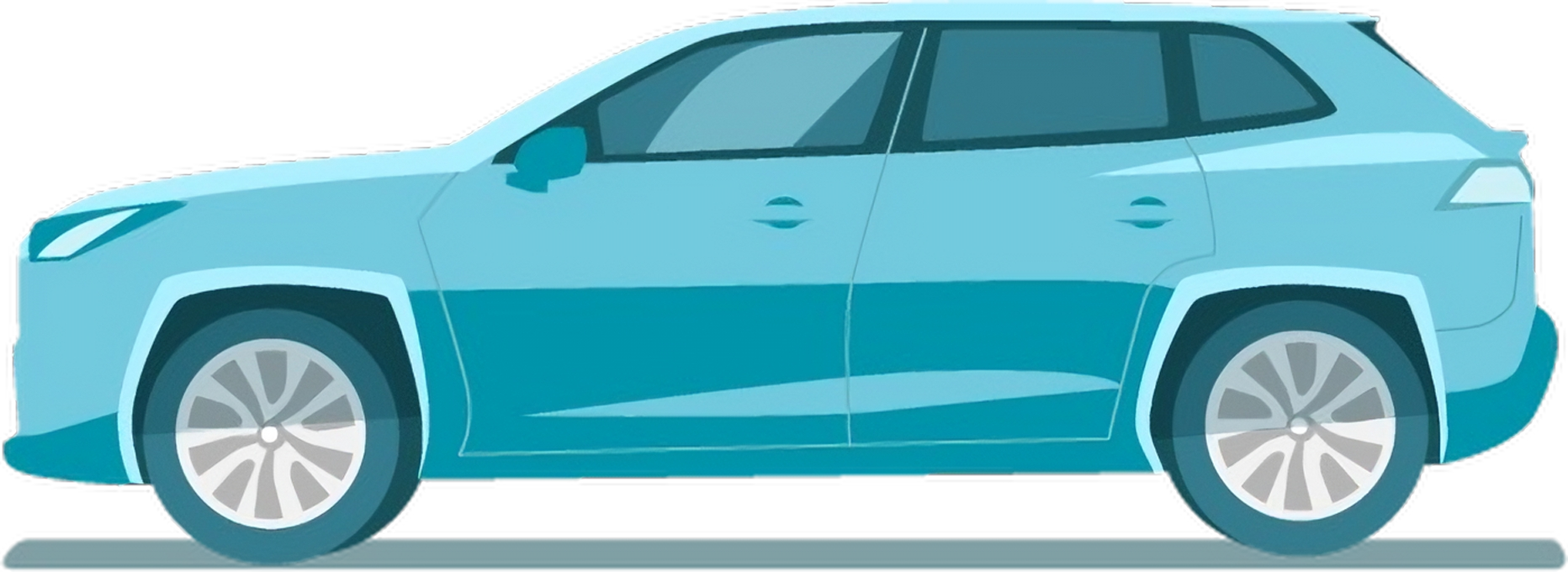
Toyota RAV 4 Prime
Plug-in Hybrid Electric Vehicles (PHEV):
are similar to HEVs but have a larger battery that can be charged by plugging into an electric power source, regenerative braking or by the internal combustion engine. Like HEVs, PHEVs can also run on gasoline and diesel fuels.
Hybrid Electric Vehicles (HEV):
are powered by traditional fuels and electric energy stored in a battery. The battery is charged by the internal combustion engine and a process known as regenerative braking. As these cars slow down during braking, energy is absorbed and captured to provide extra power when needed. The battery does not charge from external sources, like plug-in hybrids.

Honda Accord Hybrid
What Kind of Electric Vehicle Should I Buy?
Choose the type that is right for you and your lifestyle. On average, Americans drive less than 40 miles per day. If that sounds like you, a fully electric vehicle could be just what you’re looking for. Most all-electric vehicles can travel close to between 75 and 200 miles on a fully charged battery, some vehicles even achieve over 300 miles of range.
If you plan on consistently driving further than that without stopping to charge, maybe a plug-in hybrid is a better choice. Many plug-in hybrids can take you between 20 and 50 miles on battery power only, before requiring the gas engine.
Which BEVs and PHEVs Are Available in Maryland?
Many manufacturers are selling BEVs and PHEVs in Maryland! Below are some resources that show electric vehicles that are currently available for purchase:

